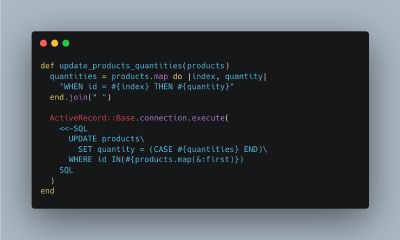How a large transaction can be a source of DB deadlocks and how this can be fixed.

Recently in a project, we encountered the fact that sometimes we had a DB Deadlocks error. After some experiments, we realized that this is due to the fact that we have too large a transaction and it mixes searching creating, and updating actions.
Code example (In the real project, the transaction was much larger):
ActiveRecord::Base.transaction do
# 1. Creating a new order
order = Order.create(user_id: current_user.id, total_price: 0)
# 2. Adding products to the order
products = Product.where(id: [1, 2, 3])
products.each do |product|
order_items = OrderItem.create(order_id: order.id, product_id: product.id, quantity: 1, price: product.price)
order.total_price += order_items.price
end
# 3. Updating user balance
user = User.find(current_user.id)
user.balance -= order.total_price
user.save!
# 4. Updating product quantity in stock
products.each do |product|
product.update(quantity: product.quantity - 1)
end
# 5. Creating a new record in user's purchase history
purchase_history = PurchaseHistory.create(user_id: current_user.id, order_id: order.id)
# 6. Sending a notification to the user about a successful purchase
message = "Thank you for your purchase! Your order №#{order.id} for the amount of #{order.total_price} rubles has been successfully placed."
Notification.create(user_id: current_user.id, message: message)
end
If we execute queries to search or retrieve data before the start of the transaction, then we will reduce the likelihood of locking tables in the database and can speed up the transaction.
# Get products that user wants to buy
products = Product.where(id: [1, 2, 3])
# Get user who is making the purchase
user = User.find(current_user.id)
# Check if user has enough balance to make the purchase
if user.balance < products.sum(:price)
# If not, display an error message
flash[:error] = "You don't have enough balance to make this purchase"
redirect_to root_path
else
ActiveRecord::Base.transaction do
# 1. Creating a new order
order = Order.create(user_id: user.id, total_price: 0)
# 2. Adding products to the order
products.each do |product|
order_items = OrderItem.create(order_id: order.id, product_id: product.id, quantity: 1, price: product.price)
order.total_price += order_items.price
end
# 3. Updating user balance
user.balance -= order.total_price
user.save!
# 4. Updating product quantity in stock
products.each do |product|
product.update(quantity: product.quantity - 1)
end
# 5. Creating a new record in user's purchase history
purchase_history = PurchaseHistory.create(user_id: user.id, order_id: order.id)
# 6. Sending a notification to the user about a successful purchase
message = "Thank you for your purchase! Your order №#{order.id} for the amount of #{order.total_price} rubles has been successfully placed."
Notification.create(user_id: user.id, message: message)
# Display a success message
flash[:success] = "Your purchase has been successfully placed!"
redirect_to root_path
end
end
Let’s take a closer look at the 4th action within a transaction. We can apply a trick here and do everything in one request.
UPDATE products
SET quantity = CASE
WHEN id = 1 THEN 5
WHEN id = 2 THEN 6
WHEN id = 3 THEN 11
END
WHERE id IN(1,2,3)
We can generate such a query using the following function:
def update_products_quantities(products)
quantities = products.map do |index, quantity|
"WHEN id = #{index} THEN #{quantity}"
end.join(" ")
ActiveRecord::Base.connection.execute(
<<-SQL
UPDATE products\
SET quantity = (CASE #{quantities} END)\
WHERE id IN(#{products.map(&:first)})
SQL
)
end
Now let’s use the new function in a transaction.
# Get products that user wants to buy
products = Product.where(id: [1, 2, 3])
# Get user who is making the purchase
user = User.find(current_user.id)
# Check if user has enough balance to make the purchase
if user.balance < products.sum(:price)
# If not, display an error message
flash[:error] = "You don't have enough balance to make this purchase"
redirect_to root_path
else
ActiveRecord::Base.transaction do
# 1. Creating a new order
order = Order.create(user_id: user.id, total_price: 0)
# 2. Adding products to the order
products.each do |product|
order_items = OrderItem.create(order_id: order.id, product_id: product.id, quantity: 1, price: product.price)
order.total_price += order_items.price
end
# 3. Updating user balance
user.balance -= order.total_price
user.save!
# 4. Updating product quantity in stock
update_products_quantities(products.pluck(:id, :quantity))
# 5. Creating a new record in user's purchase history
purchase_history = PurchaseHistory.create(user_id: user.id, order_id: order.id)
# 6. Sending a notification to the user about a successful purchase
message = "Thank you for your purchase! Your order №#{order.id} for the amount of #{order.total_price} rubles has been successfully placed."
Notification.create(user_id: user.id, message: message)
# Display a success message
flash[:success] = "Your purchase has been successfully placed!"
redirect_to root_path
end
end
I am sure that by using these tricks you will be able to further improve this transaction, for example, to predict the total cost of the order.